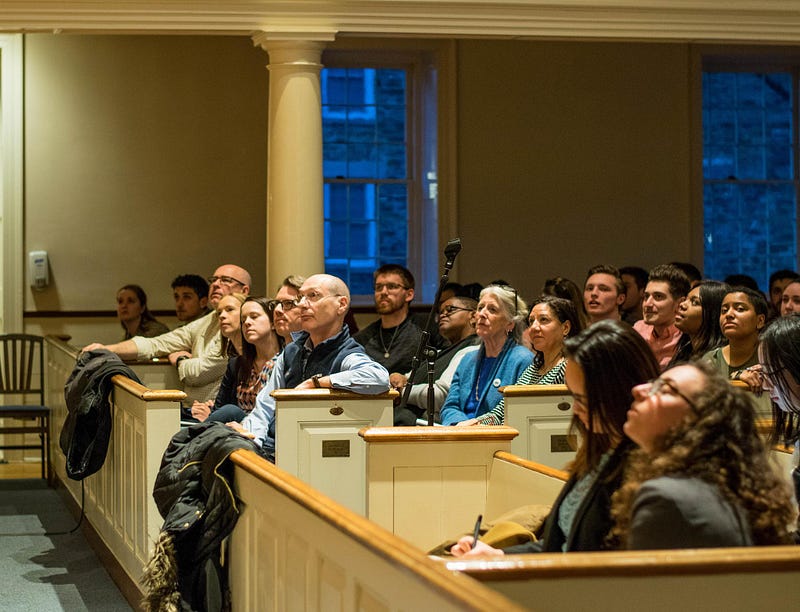
Photo Courtesy of Jade Thomas ‘20
It is no secret that the American people are divided. When it comes to issues of sexuality, climate change, human rights, and immigration, we simply can’t seem to be on the same page. I think that there will always be some degree of conflict in the world of politics and in society, but it pains me to see the failures of discourse. People are so quick to judge and label others that they don’t take the time to engage with someone that disagrees with them. All too often, they don’t take into account any information that runs contrary to their preconceived notions and instead choose to succumb to groupthink. As the old adage goes: echoes are noisier than their source.
Sadly, this is an issue that extends to Hamilton’s campus as well. From classroom conversations to social media to small group gatherings it seems that there’s often a breakdown of communication. I worry that we’re drifting away from an appreciation of debate. I posit that by silencing people and refusing to engage with them we create a political climate that allows a despot like Trump to become the leader of America. I recognize that there are some things that aren’t, and shouldn’t be, a conversation. I also recognize that I’m incredibly biased. To me, things like climate change, LGBTQ+ rights, and systemic racism aren’t open to debate. I see them as black and white issues and almost as moral ones. However, I realize that this is a hypocritical place to base myself. While bigots will be bigots, it is possible (every now and then) to change someone’s heart and mind, but only if you engage with them.
“While everyone has a right to have their voice heard, it is important to remember that there are other voices than your own. It is important to differentiate between conjecture and fact.”
There are rumors and whispers of another Town Hall, or some kind of “community conversation” that may (or may not) occur sometime this spring or next fall. It is no secret that I had strong feelings about the Town Hall last spring, and while I stand by the argument that I made, I do concede it could’ve been delivered more gently.
I’d like to take the opportunity to preempt this community conversation specifically, and comment in general about appropriate discourse and conversation on this campus. While everyone has a right to have their voice heard, it is important to remember that there are other voices than your own. It is important to differentiate between conjecture and fact. What made me most irate last spring were the false statements made about the resources the College offers and the work of specific administrators. To this end, I want to remind everyone that President Wippman, Dean Martinez, Dean Chase, and others all either have office hours or are available by appointment. If you have questions, you should ask. If you have suggestions, you should bring those up to someone who can do something about the issue. If the only time you’re willing to have that conversation is when you’re bolstered by a crowd, then it may be performative. Be willing to have the conversation when you’re not surrounded by a charged-up audience.
The organizations and clubs that work on the issues that students feel strongly about are always welcoming and actively seek new members. Student Assembly offers public comment each week, where students can speak directly to the issues that most affect them and potentially begin working towards solutions. I feel that it is irresponsible to lambast the College without making an effort to actually be part of the solution. I recognize that we are all busy with classes, jobs, sports, and a thousand other things. However, this is always going to be the case. If you want to see change, you need to be an active part of creating it and must be willing to do the hard and nitty-gritty work required.
It is 2019 and we’ve got Wi-Fi (though admittedly it isn’t the best here on campus.) It takes little to no effort to become more informed on an issue. We also have extensive resources available on campus to help you learn about things like the facts on climate change, rates of immigration, or anything else under the sun — it has never been easier to have a debate with legitimate facts to back yourself up. Know thyself and educate thyself.
It pains me to see combative conversation. When one side, or both sides, enters a conversation and is unwilling to hear any evidence contrary to their “facts,” then productive discourse is impossible. If you’re unwilling to provide suggestions or constructive commentary and instead tap into a collective sense of outrage, then we get a snowball effect of mob mentality that runs contrary to the purpose of a community conversation. A conversation is not a conversation if one side doesn’t get to speak or is spoken over when they attempt to address points that are raised.
Hamilton is a small community and, for the most part, fairly homogenous when it comes to our ideology. We are all human beings and should be treated as such. Our time on the Hill is fleeting. It is imperative that we gain the ability to engage with someone we disagree with, that we learn to make evidence-based arguments, and that we develop the critical rhetoric required for success in the “real world.” It is a disservice to the community and to ourselves if we automatically label, blame, judge, or shut down another person.
If you disagree with what I’ve said then please engage with me. Write a response for
The Spec
, email me, or accost me on Martin’s Way. Let’s practice these imperative skills. One of the most detrimental things possible, in my opinion, is the vacuous mob mentality that can arise when issues are made “moral” or “immoral.”
